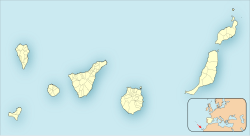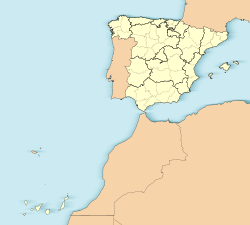This article needs additional citations for verification. (April 2014) |
Betancuria is a small town and a municipality in the western part of the island of Fuerteventura in the Province of Las Palmas, Canary Islands, Spain. The population is 811 (2013),[3] and the area is 103.64 km2 (40 sq mi).[1] It is situated in a mountainous region, 4 km (2 mi) west of Antigua and 21 km (13 mi) southwest of the island capital Puerto del Rosario. By population it is the smallest municipality in Fuerteventura as well as all of the Canary Islands. Betancuria is named after Jean de Béthencourt, who founded the town in 1404 with Gadifer de La Salle. It was the original capital of the Kingdom of the Canary Islands, and later capital of Fuerteventura.
Betancuria | |
|---|---|
Municipality | |
 Municipal location in Fuerteventura | |
| Coordinates: 28°25′30″N 14°3′20″W / 28.42500°N 14.05556°W | |
| Country | Spain |
| Autonomous Community | Canary Islands |
| Province | Las Palmas |
| Island | Fuerteventura |
| Area | |
| • Total | 103.64 km2 (40.02 sq mi) |
| Population (2018)[2] | |
| • Total | 731 |
| • Density | 7.1/km2 (18/sq mi) |
| Time zone | UTC±00:00 (WET) |
| • Summer (DST) | UTC+01:00 (WEST) |
In 1424 Pope Martin V erected in Betancuria brief Bishopric of Fuerteventura, which encompassed all the Canary Islands except the island of Lanzarote.[4] The origin of this bishopric is directly related to the events that occurred after the Great Schism (1378-1417). This was due to the fact that the bishop of San Marcial del Rubicón in Lanzarote (only diocese at the time of the Canary Islands) did not recognize the papacy of Martin V, as this bishop was a supporter of anti-Pope Benedict XIII. The Bishopric of Fuerteventura was based in Parish of Santa María de Betancuria, for it to rank high cathedral. After the reintegration of the Diocese of San Marcial del Rubicón in the papacy of Martin V, the Bishopric of Fuerteventura was abolished only seven years after it was created in 1431.[5] It was razed by pirates in 1593, but remained capital of Fuerteventura until 1834, when Antigua became capital. In Vega de Rio Palmas is the hermitage of the Virgen de la Peña, the patron saint of the island of Fuerteventura.
Gallery
editSee also
editReferences
edit- ^ a b Instituto Canario de Estadística, area
- ^ Municipal Register of Spain 2018. National Statistics Institute.
- ^ Instituto Canario de Estadística Archived April 19, 2014, at the Wayback Machine, population
- ^ El Cisma de Occidente y el Obispado de Fuerteventura
- ^ El Cisma de Occidente y el Obispado de Fuerteventura




